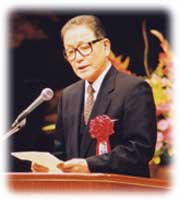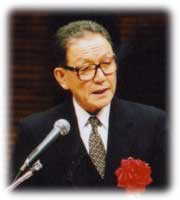Introduction of the Recipients Yoneo Ishii, Chairman of the Selection Committee
Introduction of the Recipients Yoneo Ishii,Chairman of the Selection Committee
(President of Kanda university of International Studies)
 Selection of the recipients of The Japan Foundation Awards and the Japan Foundation Special Prizes for fiscal 2002 was made upon the basis of recommendations received from a broad range of people, including former recipients from all the countries of the world, knowledgeable people in Japan, groups involved in cultural exchange, such educational and research organizations as universities, the ambassadors to Japan from foreign countries, and the heads of overseas Japanese government facilities.
Selection of the recipients of The Japan Foundation Awards and the Japan Foundation Special Prizes for fiscal 2002 was made upon the basis of recommendations received from a broad range of people, including former recipients from all the countries of the world, knowledgeable people in Japan, groups involved in cultural exchange, such educational and research organizations as universities, the ambassadors to Japan from foreign countries, and the heads of overseas Japanese government facilities.
A selection committee meeting was held on July 31, 2002, for the purpose of choosing two recipients for The Japan Foundation Awards and three groups for the Japan Foundation Special Prizes, out of the 169 individuals and groups thus nominated.
Apart from myself, this year's selection committee consisted of the following nine members:
Shinichiro Asao, advisor to the Japan Foundation
Setsuho Ikehata, president of Tokyo University of International Studies
Takashi Oshio, president of Ferris University
Hayao Kawai, secretary of the Agency for Cultural Affairs and clinical psychologist
Hatsuhisa Takashima, director of the United Nations Information Center in Tokyo
Hiroko Nakamura, pianist
Yoshihiko Miyauchi, president of Orix, Inc.
Masakazu Yamazaki, critic and playwright
Yoneo Ishii, president of Kanda University of International Studies
Committee Member Takashima resigned from the selection committee on July 31 due to his appointment to the post of press secretary for the Ministry of Foreign Affairs.
The recipients of the fiscal 2002 Japan Foundation for Awards are Makoto Ooka, poet, and Gerald L. Curtis, Burgess Professor of Political Science of Columbia University. And the recipients of the fiscal 2002 Japan Foundation Special Prizes are the "Japanese Mothers for Foreign Students" Movement of the Tokyo YWCA, the Old Japan Students' Association, Thailand (OJSAT), and the Department of Japanese and Korean Studies of the Oriental Studies Institute of Warsaw University.
Makoto Ooka, who is involved in broad-ranging literary activities in the field of "words" as poet, critic, and historian, has made an enormous contribution toward popularizing of the charm of the Japanese language both at home and abroad. His unstinting efforts over the past more than 20 years toward development of linked-verse (renga and renshi) exchange with the poets and literati of the world, the first experiment of its kind ever carried out, have served to carve out new horizons for cultural and international exchange in the field of literature, as a result of which he was chosen as a recipient this time.
 Professor Curtis has achieved enormous accomplishments in the introduction of culture and mutual understanding among Japan, America, and other countries as one of the world's most prominent political scientists knowledgeable about Japan, and he also assiduously strives toward the nurturing of outstanding successors in the field. He himself has made a huge contribution to the promotion of mutual understanding between Japan and the United States through his keen and astute analyses of Japanese politics, which he has made public through the mass media of both countries, placing him among the top ten American leaders in Asian studies by Newsweek. Aside from his numerous publications, including The Japanese Way of Politics, Nihon no Seiji o Do Miru Ka and his recent Logic of Japanese Politics, he has exerted unstinting efforts for many long years as the head of the East Asian Studies Institute of Columbia University, and through his teaching and guidance at Keio University, the Graduate Research Institute for Policy Studies, and the Collège de France.
Professor Curtis has achieved enormous accomplishments in the introduction of culture and mutual understanding among Japan, America, and other countries as one of the world's most prominent political scientists knowledgeable about Japan, and he also assiduously strives toward the nurturing of outstanding successors in the field. He himself has made a huge contribution to the promotion of mutual understanding between Japan and the United States through his keen and astute analyses of Japanese politics, which he has made public through the mass media of both countries, placing him among the top ten American leaders in Asian studies by Newsweek. Aside from his numerous publications, including The Japanese Way of Politics, Nihon no Seiji o Do Miru Ka and his recent Logic of Japanese Politics, he has exerted unstinting efforts for many long years as the head of the East Asian Studies Institute of Columbia University, and through his teaching and guidance at Keio University, the Graduate Research Institute for Policy Studies, and the Collège de France.
For more than forty years, since 1961, when the receiving environment for exchange students was not is good order, the "Japanese Mothers for Foreign Students" Movement has continued volunteer efforts not only toward exchange of the heart between teams of one exchange student and one mother, but also toward helping them solve those problems through the mothers' acceptance of the problems faced by the students. The number of exchange students teams up to the present has included 3,555 students from 54 countries. The "Mothers" have continued to provide support in the daily lives of exchange students both materially and psychologically and to encourage them in their studies in Japan, far away from their homes, through such activities as the provision of centers for conversation and counseling, the offering of supplementary Japanese-language classrooms, and the establishment of a scholarship system. This persevering and warm movement has contributed to the deepening of mutual trust among the young people of the world and of true international exchange, and it is in recognition of these efforts that the movement has been chosen as a recipient of the Japan Foundation Special Prizes.
This Old Japan Students' Association, Thailand, has the longest history of its kind in all Asia, and it is familiar to many under the name OJSAT. Since its founding in 1951, over a period of many years, it has made an enormous contribution toward the uniting of former exchange students to Japan in Thailand and the enhancement of their social positions, and the strengthening of mutual exchange. The Association has also made efforts toward the promotion and development of Japanese-language education, as well as toward the introduction of such aspects of Japanese culture as flower-arranging (ikebana) and the tea ceremony, for the purpose of promoting the development of mutual understanding and friendly relations between Japan and Thailand. It has a present Membership of 2,700 people. It also carries out such activities as the holding of a Japan exchange-students fair for the nurturing of young people who are to become leaders in the next generation. Thus it continues to play an indispensable role in the formulation and maintenance of friendly relations between Japan and Thailand today. It is both in recognition of its great contributions and in the hope that it will continue such activities into the future that the Association was selected as a recipient of the Japan Foundation Special Prizes.
The Department of Japanese and Korean Studies of the Oriental Studies Institute of Warsaw University is the oldest Japanese studies department in Poland. It has a long and proud history of service not only as a core organization for Japanese studies for both Poland and all of Central Europe, but, thanks to the efforts of such outstanding Japanologists as Professor ![]() , it has also made outstanding achievements in the field of Japanese studies using its own unique methodology, and it has made high-quality achievements in such fields as language education, linguistics, literature, theatre, philosophy and religion, and history. During the 83 years since its founding in 1919, in spite of the severe environment in central Europe with its constant and violent regional changes, it has given birth to numerous prominent Japanologists. It is in recognition of these efforts and accomplishments, and with the hope for its further future development, that it was chosen as a recipient of the Japan Foundation Special Prizes.
, it has also made outstanding achievements in the field of Japanese studies using its own unique methodology, and it has made high-quality achievements in such fields as language education, linguistics, literature, theatre, philosophy and religion, and history. During the 83 years since its founding in 1919, in spite of the severe environment in central Europe with its constant and violent regional changes, it has given birth to numerous prominent Japanologists. It is in recognition of these efforts and accomplishments, and with the hope for its further future development, that it was chosen as a recipient of the Japan Foundation Special Prizes.
Thank you for you kind attention.
- What We Do Top
- Arts and Cultural Exchange [Culture]
- Japanese-Language Education Overseas [Language]
- Japanese-Language Education Overseas [Language] Top
- Learn Japanese-language
- Teach Japanese-language
- Take Japanese-Language Test
- Know about Japanese-language education abroad
- The Japanese-Language Institute, Urawa
- The Japanese-Language Institute, Kansai
- Japanese-Language Programs for Foreign Specified Skilled Worker Candidates
- Japanese Language Education for Japanese Children Resident Overseas and for the Descendants of Migrants
- Archives
- Japanese Studies and Global Partnerships [Dialogue]
- JF digital collection
- Other Programs / Programs to Commemorate Exchange Year
- Awards and Prizes
- Publications
